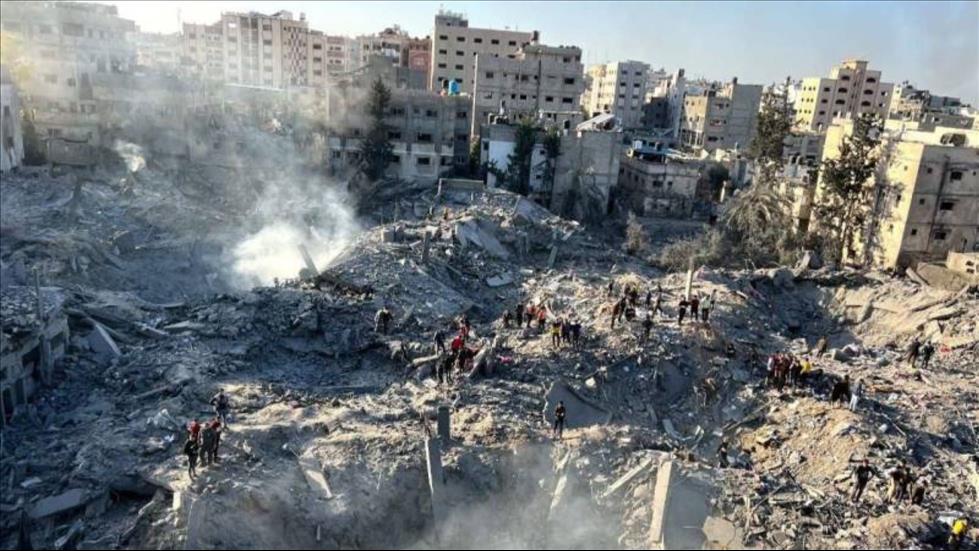
100 Days On, Ceasefire Remains Elusive In Gaza, Yet There's Still Hope Analyst
KUALA LUMPUR, Jan 14 (NNN-Bernama) - Sunday marks the 100th day since the outbreak of the Israel-Hamas war on Oct 7 in the Gaza Strip with no ceasefire in sight amidst a substantial death toll and destruction in the besieged enclave.
However, despite the grim situation, analyst Dr Ahmad Badri Abdullah remains hopeful that a lasting ceasefire could be achieved as the negotiation process involving concerned parties continues.
The Deputy CEO of the International Institute of Advanced Islamic Studies (IAIS) Malaysia told Bernama that some factors contribute to the ongoing hope for a ceasefire, including the release of hostages, the willingness of Hamas to further negotiate for a ceasefire, the international community's calls for a ceasefire, and the United States (US) toning down its support to Israel's invasion.
Ahmad Badri highlighted a major international effort to halt Israeli aggression in Gaza at present, South Africa's application against Israel at the International Court of Justice (ICJ) accusing the regime of violating the 1948 Genocide Convention in its military operations in Gaza.
“South Africa points to violations of the Genocide Convention, citing actions such as the significant killing of Palestinians, particularly children, destruction of homes, expulsion, displacement, and imposition of blockades on essential resources like food, water, and medical aid.
“The country has also requested interim measures that Israel should suspend military operations, stop killing Palestinians, prevent forced displacement, and deprivation of access to adequate food, water, fuel, shelter, and sanitation,” he said.
Malaysia has officially announced its support for South Africa's case and the first hearing of the case was held in The Hague on Jan 11 and 12.
Ahmad Badri noted that the adoption of a resolution demanding an immediate humanitarian ceasefire by the United Nations (UN) General Assembly on Dec 12 was also a significant international effort to halt the relentless Israeli attacks in Gaza.
He added neighbouring country, Qatar, has effectively brought together its influence over Hamas and the diplomatic expertise garnered in conflict areas to help co-lead the negotiations with Egypt.
International organisations like Oxfam and Project HOPE have also called for a ceasefire, he said, adding that IAIS Malaysia's Chairman Dr Maszlee Malik sent letters to 19 religious leaders worldwide on Dec 27, calling them to urge for a ceasefire in Gaza.
However, Ahmad Badri said some concerns and challenges could hinder the achievement of a lasting ceasefire, noting that there is potential for violence to resume if the underlying issues that caused the conflict remain unaddressed.
“The situation in Gaza remains dire, with residents facing homelessness, hunger and fear of further violence, and fear of eviction altogether from the strip,” he said.
Hamas has stated that a complete ceasefire is a prerequisite for the release of hostages, emphasising the importance of ending the aggression and massacres of the Palestinian people, he added.
“The organisation (Hamas) has insisted on an end to Israel's offensive in Gaza before hostage talks can begin, emphasising that they are not looking for a brief lull just to cover the hostage swap,” he said.
On Malaysia's role, Ahmad Badri pointed out that Malaysia can leverage its unique position and influence to advocate for the rights and dignity of the Palestinians on various levels.
He highlighted some policy recommendations that Malaysia can pursue, including seeking more leadership roles on international platforms such as the UN and leading the formation of a respectable think tank that can act as a lobby in the United States, the main ally and supporter of Israel.
“The think tank can collaborate with key ally states such as Turkiye, Pakistan, Indonesia, and South Africa, which share similar views and interests on the matter, and coordinate their efforts to influence the US and other Western countries,” he said.
At the regional level, Ahmad Badri said Malaysia should also play an active role in regional platforms such as the Non-Aligned Movement (NAM) and the Association of Southeast Asian Nations (ASEAN), where it can rally the support and solidarity of other developing and emerging countries for the Palestinian cause.
Ahmad Badri also suggested that Malaysia initiate and participate in inter-civilisational dialogue with key global religious leaders, assume a leading role in the Islamic world, and formulate comprehensive religious fatwas addressing the Palestinian issue from an Islamic perspective.
- NNN-BERNAMA

Legal Disclaimer:
MENAFN provides the
information “as is” without warranty of any kind. We do not accept
any responsibility or liability for the accuracy, content, images,
videos, licenses, completeness, legality, or reliability of the information
contained in this article. If you have any complaints or copyright
issues related to this article, kindly contact the provider above.


















Comments
No comment